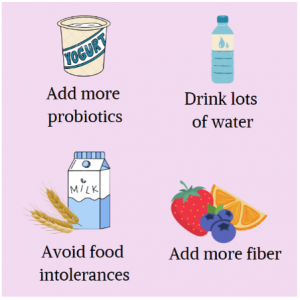Be Friendly to your Gut: Irritable Bowel Syndrome
Nov 2 / CATEGORY: Nutrition
Estimated Read Time: 2 minutes 14 seconds
 Let’s talk about IBS. IBS, or irritable bowel syndrome, is a gastrointestinal (GI) disorder that has a wide variety of symptoms including abdominal pain and changes in bowel movements. There are 3 different types of irritable bowel syndrome: with constipation (IBS-C), with diarrhea (IBS-D), and with mixed bowel habits (IBS-M).
Let’s talk about IBS. IBS, or irritable bowel syndrome, is a gastrointestinal (GI) disorder that has a wide variety of symptoms including abdominal pain and changes in bowel movements. There are 3 different types of irritable bowel syndrome: with constipation (IBS-C), with diarrhea (IBS-D), and with mixed bowel habits (IBS-M).
ETIOLOGY: IBS affects 15% of the world’s population, most commonly occurring in people in their late teens to early forties. There is no distinct cause for this gut disorder, but stress, a family history of IBS, and food intolerances are some associated risk factors for developing the condition.
TREATMENT: Although IBS cannot be “cured,” there are many proactive ways to reduce symptoms.
Dietary Patterns: Since each person with IBS has unique symptoms and triggers, there is not a one size fits all solution. The first step to finding your solution is figuring out what is causing your symptoms to flare up. A great start is to record typical daily food intake and GI symptomology, then review this log with a registered dietitian. A registered dietitian can identify common and less obvious foods and patterns that correspond to your symptoms.

Common offensive foods include: cruciferous vegetables, lentils and beans, overly spicy or heavily spiced foods, caffeine, and alcohol.
- Increasing the amount of fiber in your diet to a recommended 25 grams (female) and 38 grams (male).
- Drink plenty of water daily, at least 64oz.
- Add more food-based probiotics to the diet, e.g., yogurt, sauerkraut, miso and tempeh.
- Limit foods you have an intolerance to, such as lactose.
FODMAP: For some individuals with IBS, following the FODMAP diet may be helpful. Fermentable, Oligosaccharides, Disaccharides, Monosaccharides and Polyols (FODMAPs) are different types of carbohydrates that may be poorly digested in the gut by those with IBS. There are 3 phases to the FODMAP diet: Elimination, Reintroduction, Personalization. Following this diet requires a good knowledge of the FODMAP compositions of many foods and it is recommended to work with a registered dietitian during the 3-phases.
Dietary Timing: Specific food choices can lead to obvious GI irritation, and the timing of your meals can also be important.
- Establish a meal and snack schedule.
- Avoid long gaps of time between eating.
- Avoid consuming overly large meals.
 Although it may sound tedious, eating around the same time daily can help regulate your GI tract and bowel movements. If you often eat 3 large meals per day, try eating smaller, more frequent meals and snacks during the day, which can reduce the stress placed on the GI tract caused by large food volume.
Although it may sound tedious, eating around the same time daily can help regulate your GI tract and bowel movements. If you often eat 3 large meals per day, try eating smaller, more frequent meals and snacks during the day, which can reduce the stress placed on the GI tract caused by large food volume.
Are you struggling to find a variety of foods that won’t trigger your IBS symptoms? Use the link to schedule a 60-minute nutrition session with RecSports’ registered dietitian and certified intuitive eating counselor.
This post was co-written by:
Jessie is a Registered Dietitian and Assistant Director for Fitness & Wellness at University of Florida’s Department of Recreational Sports where she does individual nutrition counseling and coaching with the UF community. Follow her on Instagram for more nutrition tidbits.
Rachel is a 4th-year UF Pre-professional Biology student and Program Assistant with Nutrition Services at the Department of Recreational Sports.
